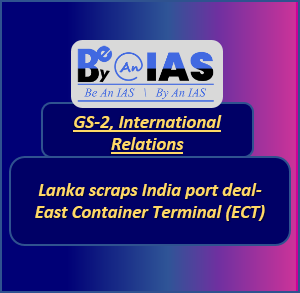CURRENT AFFAIRS
Get the most updated and recent current affair content on Padhaikaro.com
Lanka scraps India port deal-East Container Terminal (ECT)
- Be N By IAS, Delhi
- 13, Feb 2021

For : GS-2: International relations
CONTEXT:
- IN A SETBACK for India, the Rajapaksa government in Sri Lanka, which is facing the threat of nationwide agitations against port privatisation, has cancelled the Port deal.
- It was an agreement signed by the previous regime in 2019 for India and Japan to develop the strategic East Container Terminal (ECT) at Colombo port with Adani Group as an investor.
AGREEMENT FOR STRATEGIC EAST CONTAINER TERMINAL:
- Agreement: Signed in May 2019, to jointly develop the strategic terminal with the Sri Lanka Ports Authority (SLPA) holding a 51% stake and India and Japan holding 49% together.
- The Adani Group from India, along with Japanese companies, was to invest in the project expected to cost up to $700 million, as per official estimates.
WHY SCRAPPED DEAL:
- Three High level Cabinet Meetings: The three high-level meetings follow the Sri Lankan government’s cabinet decision, in the wake of raging protests by port workers’ unions opposed to foreign investment in the facility.
- Protest by 23 trade unions: At the Colombo port, backed by over 220 unions across the country, announced an agitation against the project being given to “foreign” companies.
- When President Gotabaya Rajapaksa assured the protesters that only 49 per cent stake was being given, they cited his own poll manifesto that found fault with the 2019 agreement.
- Threat to Political stability of Government: “The President stood by the agreement until the last moment but the support gained by port trade unionists was posing a threat to his position as aggressive nationalists and civil society groups extended support to the port workers.
INDIA-JAPAN AND SRI LANKA:
- Second Setback: This is the second instance of Sri Lanka reversing an agreement on a large infrastructure project involving Japan.
- First Setback: When Sri Lankan government scrapped the $1.5 billion, Japan-funded Light Rail Transit system last year.
- Adhere to Commitments: The thrust of the Indian envoy’s message to the Sri Lankan leadership, sources said, was that Colombo must adhere to its commitments in the tripartite agreement.
- Priority project for India: External Affairs Minister S Jaishankar had tagged the ECT as a priority project for India during his visit to Colombo last month.
IMPORATANCE FOR INDIA:
- Security reason: The ECT project was considered important for India, mainly for security reasons.
- As the China holds 85 per cent stake in the Colombo International Container Terminal (CICT)
- Which is near the ECT.
- Commercial reason: Over 70 % of business at Colombo port is from ships in transit to the Indian coast, making it important for Sri Lanka, too.
- Incidentally, the Adani Group is also building a transhipment port at Vizhinjam near Thiruvananthapuram in Kerala, which is being developed primarily to wean away India-bound trans-shipment traffic from Colombo.
CONSEQUENCES AND REACTIONS:
- Alarm in India and Japan: The development has sparked alarm in India and Japan, according to diplomatic sources, who said Sri Lanka had neither conveyed its decision, nor offered the alternative proposal to either of the partners.
- Funding issue for Sri Lanka: Asked how Sri Lanka would mobilise funds to develop the SLPA, especially after the economic impact of the pandemic.
- Udaya Gammanpila, a Cabinet spokesman, on Tuesday said, “SLPA is going to use its own funds, as well as borrow money from local commercial banks.”
ALTERNATIVE-WEST CONTAINER TERMINAL:
- Sensitive diplomatic issue: On whether Sri Lanka had discussed the option of developing the West Container Terminal with India, he said, “This is a sensitive diplomatic issue. Sri Lanka is always keen to maintain cordial diplomatic ties with India.
- Reconciliatory move as offer of WCT: Sri Lanka has offered India another undertaking to develop the West Container Terminal (WCT) at the same facility on a Public Private Partnership model along with Japan.
- India not interested: Sri Lankan officials acknowledged that India is not keen on an alternate arrangement and views the decision as “unilateral”.
- The Indian High Commission in Colombo has called on “all sides” to “abide by the existing understandings and commitment”.
EAST CONTAINER TERMINAL V. WEST CONTAINER TERMINAL:

Source: The Hindu, Indian Express
CHINTAN MAINS QUESTION:
Q. Colombo must adhere to its commitments in the tripartite agreement. Discuss this statement in the context of recent Sri Lanka scrapping of India port deal of East Container Terminal.